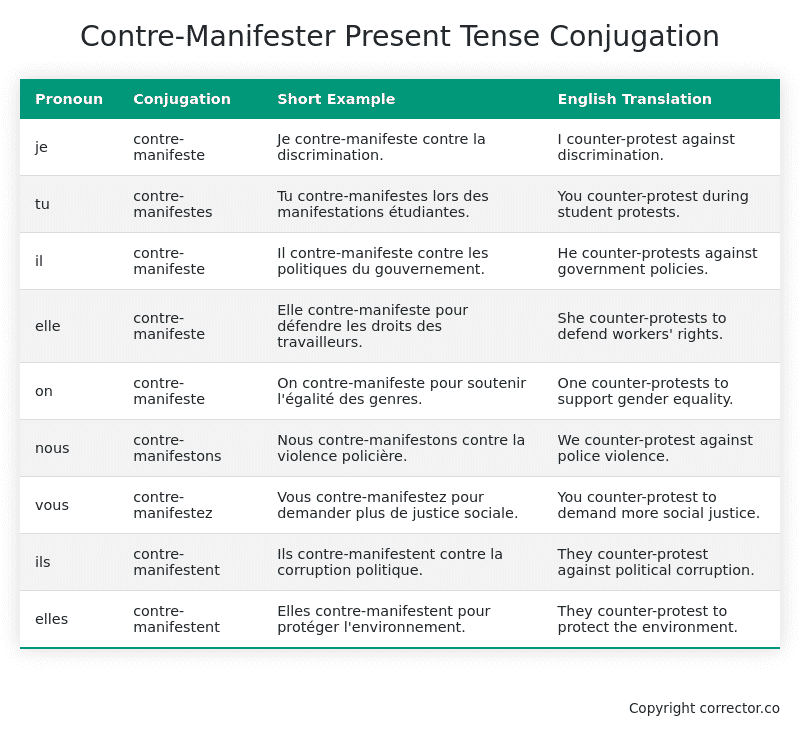Le Present (Present Tense) Conjugation of the French Verb contre-manifester
Introduction to the verb contre-manifester
The English translation of the French verb “contre-manifester” is “to counter-demonstrate.” The pronunciation of the infinitive form “contre-manifester” is: kohn-truh-mah-nee-fes-tay.
The word “contre-manifester” is a compound verb formed by combining the prefix “contre-” (meaning “against”) and the verb “manifester” (meaning “to demonstrate”). It is mainly used in everyday French to express the action of protesting or demonstrating in opposition to another demonstration or event.
Examples of usage:
-
Les étudiants ont décidé de contre-manifester contre la réforme de l’éducation.
(The students decided to counter-demonstrate against the education reform.) -
Les habitants du quartier ont organisé une manifestation pour contre-manifester contre le projet de construction d’une autoroute.
(The residents of the neighborhood organized a demonstration to counter-protest against the highway construction project.) -
Certains groupes politiques ont appelé à contre-manifester lors de la marche des nationalistes.
(Certain political groups called for counter-demonstrating during the nationalists’ march.)
Contre-Manifester – About the French Present Tense
To take a deep dive into all the French tenses then see our article on Mastering French Tense Conjugation.
Common Everyday Usage Patterns For Le Present
Interactions with Other Tenses
Table of the Present Tense Conjugation of contre-manifester
| Pronoun | Conjugation | Short Example | English Translation |
|---|---|---|---|
| je | contre-manifeste | Je contre-manifeste contre la discrimination. | I counter-protest against discrimination. |
| tu | contre-manifestes | Tu contre-manifestes lors des manifestations étudiantes. | You counter-protest during student protests. |
| il | contre-manifeste | Il contre-manifeste contre les politiques du gouvernement. | He counter-protests against government policies. |
| elle | contre-manifeste | Elle contre-manifeste pour défendre les droits des travailleurs. | She counter-protests to defend workers’ rights. |
| on | contre-manifeste | On contre-manifeste pour soutenir l’égalité des genres. | One counter-protests to support gender equality. |
| nous | contre-manifestons | Nous contre-manifestons contre la violence policière. | We counter-protest against police violence. |
| vous | contre-manifestez | Vous contre-manifestez pour demander plus de justice sociale. | You counter-protest to demand more social justice. |
| ils | contre-manifestent | Ils contre-manifestent contre la corruption politique. | They counter-protest against political corruption. |
| elles | contre-manifestent | Elles contre-manifestent pour protéger l’environnement. | They counter-protest to protect the environment. |
Other Conjugations for Contre-Manifester.
Le Present (Present Tense) Conjugation of the French Verb contre-manifester (You’re reading it right now!)
Imparfait (Imperfect) Tense Conjugation of the French Verb contre-manifester
Passé Simple (Simple Past) Tense Conjugation of the French Verb contre-manifester
Passé Composé (Present Perfect) Tense Conjugation of the French Verb contre-manifester
Futur Simple (Simple Future) Tense Conjugation of the French Verb contre-manifester
Futur Proche (Near Future) Tense Conjugation of the French Verb contre-manifester
Plus-que-parfait (Pluperfect) Tense Conjugation of the French Verb contre-manifester
Passé Antérieur (Past Anterior) Tense Conjugation of the French Verb contre-manifester
Futur Antérieur (Future Anterior) Tense Conjugation of the French Verb contre-manifester
Subjonctif Présent (Subjunctive Present) Tense Conjugation of the French Verb contre-manifester
Subjonctif Passé (Subjunctive Past) Tense Conjugation of the French Verb contre-manifester
Subjonctif Imparfait (Subjunctive Imperfect) Tense Conjugation of the French Verb contre-manifester
Conditionnel Présent (Conditional Present) Tense Conjugation of the French Verb contre-manifester
Conditionnel Passé (Conditional Past) Tense Conjugation of the French Verb contre-manifester
Conditionnel Passé II (Conditional Past II) Tense Conjugation of the French Verb contre-manifester
L’impératif Présent (Imperative Present) Tense Conjugation of the French Verb contre-manifester
L’impératif Passé (Imperative Past) Tense Conjugation of the French Verb contre-manifester
L’infinitif Présent (Infinitive Present) Tense Conjugation of the French Verb contre-manifester
L’infinitif Passé (Infinitive Past) Tense Conjugation of the French Verb contre-manifester
Le Participe Présent (Present Participle) Tense Conjugation of the French Verb contre-manifester
Le Participe Passé (Past Participle) Tense Conjugation of the French Verb contre-manifester
Struggling with French verbs or the language in general? Why not use our free French Grammar Checker – no registration required!
Get a FREE Download Study Sheet of this Conjugation 🔥
Simply right click the image below, click “save image” and get your free reference for the contre-manifester present tense conjugation!

I hope you enjoyed this article on the verb contre-manifester. Still in a learning mood? Check out another TOTALLY random French verb present conjugation!


